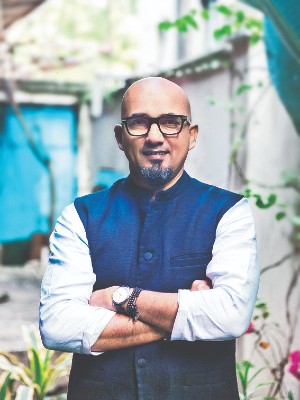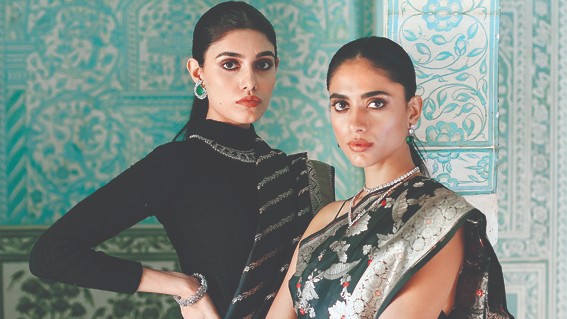He has always been fascinated by saris, having grown up in a family of sari connoisseurs with his mother and aunts. The versatile clothing item would become his calling much later though, after his stint at marketing and sales in FMCGs and the banking sector. He figured he would like to be his own boss. Joydeep Roy today is the founder and creative head Coloroso. He chats with The Telegraph about how the sari brand came into being.
Is there a story behind the genesis of Coloroso?
Fashion for me is synonymous with creation and I wanted to become a creator for the longest time. I did not have any formal training in fashion but have always admired beauty in every walk of life. While working for high-end brands as a marketing expert, I felt the need to nurture my own creative expression and Coloroso emerged.
How old is the brand? Tell us a bit about the name.
Coloroso was founded in 2013. Our brand focuses on capturing the kaleidoscopic exuberance of India’s rich and varied cultural heritage. The name has more to do with emotions... I believe it implies a burst of colour that captures sublime beauty.
What made you fall in love with Benarasi saris?
The luxuriousness of an intricate handwoven Benarasi is unparalleled. In an era of fleeting trends, I wanted Coloroso to redefine its roots by giving the ancient weaving technique a unique twist. Restricting Benarasi to the bridal trousseau seemed unfair and I wanted to reinvent its versatility by experimenting with colours, fabric, and motifs.
Benarasi saris are such a broad term. Can you take us through the various kinds?
Benarasis can be classified by the use of fabric and design. The most common fabric is the katan silk but georgette, organza, tussore and satin are also used. There are some classic patterns used in Benarasi like the buti, jangla, meenakari... and the list goes on. A perfect sari is one that strikes a fine balance between the two.
Do you have your favourites?
It is very difficult to choose but a good kadhua weave always catches my eye. I think it depends on the precision and the design more than a particular type. Like I said before, Benarasi is all about balance and innovation.
There are also so many fake Benarasis. What’s the test of a real Benarasi?
Its’ really difficult to differentiate a pure and a fake. I think eyes never lie. The one way to find out is to reverse the Benarasi to check for floats between the grids of warps and wefts. The machine fails to replicate that pattern of a handwoven Benarasi. It is best to go to a trustworthy store as they will never sell fake or faux fabrics and zari.

Joydeep Roy Sourced by the correspondent
Benarasi has also broken the myth of them being only wedding wear. How do you see young girls buying their wedding Benarasis?
I think young girls are reimagining bridalwear and it has given designers a lot of scope for innovation. While there are many takers of a traditional red Benarasi, I know a lot of people who opt for different colours and minimalistic designs. The idea that the wedding sari needs to be preserved is now changing and girls want to invest in something that they can wear on multiple occasions.
When did Coloroso diversify into other sari stories?
Our brand stands for ethical and sustainable fashion. We have broadened our horizons recently with experiments such as chikankari on khadi, batik on linen, zari linen, screen print on silk and of course jamdanis from Dhaka.
What are your favourite saris from across India?
I find jamdanis almost ethereal. The craftsmanship that goes in keeping with the classic weaving technique alive is worthy of admiration.
Finally, saris are eternal because…
They are versatile. The six yards of unstitched fabric can be draped in different ways and there are a plethora of styles available. You can pick one and mould it in a unique way. No other garment offers such freedom of self-expression.











